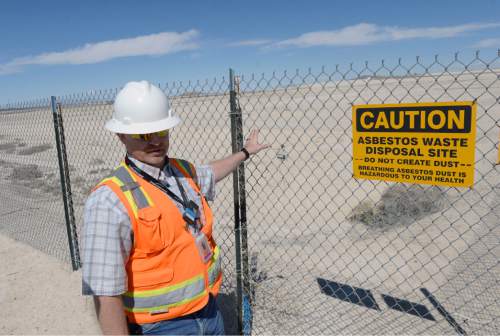This is an archived article that was published on sltrib.com in 2015, and information in the article may be outdated. It is provided only for personal research purposes and may not be reprinted.
Utah's depleted uranium debate just got a Texas twist with EnergySolutions' announcement that it has entered a deal to acquire its only U.S. competitor for managing interstate radioactive waste.
The Salt Lake City-based company intends to buy Waste Control Specialists (WCS), a facility near Andrews in the west Texas desert capable of permanently disposing of the nation's 700,000-ton stockpile of depleted uranium.
The heavy, granular material is a waste product from the uranium enrichment process for fabricating nuclear fuel and explosives. This material, contained in drums, is currently classified as low-level, but over hundreds of thousands of years it has become increasingly radioactive, so its disposal presents a hazard to the environment now and will continue to do so long after human civilization is gone.
The deal, announced Thursday, raises the question whether EnergySolutions will step back from its controversial proposal to license a depleted uranium landfill at its Clive dump west of Salt Lake City in Tooele County. The more fully developed Texas site is already licensed for burying depleted uranium (DU), so why not dispose of the waste there and avoid the expense of completing a DU cell in Utah?
But EnergySolutions spokesman Mark Walker said the firm is committed to completing the rigorous, costly licensing process for Clive. The Department of Energy, the federal agency looking to contract with the private sector for DU disposal, has indicated it wants two commercial sites for disposing stockpiles currently held at nuclear sites in Ohio, South Carolina and Kentucky, Walker said.
The WCS deal comes on the heels of EnergySolutions' announcement that it has entered a separate agreement to sell its technology division, evidence the Utah-based firm is retrenching in the disposal business. This represents a departure from the full-service integrated enterprise the company aspired to under the leadership of former CEO Steven Creamer.
"We are getting to what our core capacities are. Logistics and disposal. That's what we are really good at," Walker said. The company hopes to build on its success decommissioning power plants in the nation's aging nuclear fleet, in addition to landfilling radioactive waste.
In that deal, announced Tuesday, EnergySolutions will sell its 650-employee projects, products and technology division for $318 million to UK-based W.S. Atkins.
Two days later, EnergySolutions' announced its intent to acquire the 1,338-acre west Texas landfill from Dallas-based Valhi, Inc. for $270 million in cash and $20 million in stock. EnergySolutions also would assume $77 million in Valhi's debt.
"Combining our capabilities will bring improved operational efficiencies and allow us to deliver a safe and seamless supply chain that better serves the needs of commercial and government customers," CEO and president David Lockwood said in a news release. "In addition to the ongoing utilization of all the acquired assets, we intend to continue to seek expansion opportunities in the nuclear services area."
Although it might appear the technology division sale would finance the WCS acquisition, Walker emphasized the two deals are independent and both are subject to scrutiny of anti-trust regulators before they are finalized.
"We hope both will be completed in 2016, but you can't give an estimated time for when those deals close," Walker said.
Predicting when or even if EnergySolutions will win approval to landfill DU in Utah is far more difficult.
For several years, it has been trying to win approval to bury the waste in an 80-acre cell it has prepared at Clive. The Utah Department of Environmental Quality has insisted on a thorough assessment of the cell's ability to contain the waste. Critics say the cell is too shallow and too close to an aquifer to safely hold a material that will become intensely radioactive over time and remain dangerous for millions of years.
Back in April, EnergySolutions withdrew its performance assessment after a DEQ consultant raised a number of concerns, particularly in light of the geologic likelihood that Lake Bonneville would someday return and inundate the site. Walker said the company intends to submit the revised assessment in the next month or two.
"We want to complete this process to show whether Clive is suitable for disposal DU," Walker said. "We are moving forward. It's business as usual."
Brian Maffly covers public lands for Salt Lake Tribune. He can be reached at bmaffly@sltrib.com or 801-257-8713.
Twitter: @brianmaffly



